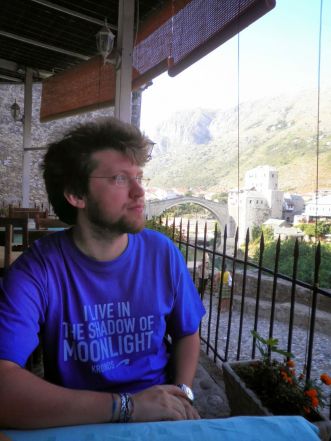
1. The European Union has often been criticized as being distant and bureaucratic. What room is there for young people in the European project?
I think that it is right in these moments that there is more room for the younger generations (or better: for their engagement), since the older ones have clearly failed to propose satisfactory solutions, and young people are the ones who are paying the highest cost. Therefore, the only possibility to make a change is to get involved into political or civic association/movements, and this is exactly what JEF does.
Anyways, we have to acknowledge that this might not be a mainstream way of thinking, since surveys are showing - at least in some European countries - a dis-engagement of young generation towards activism. I think that JEF should continue pursuing its aim to engage youth into political and social activism going forward.
2. What are the areas in which the Union needs to extend its cooperation immediately and what are the areas in which it needs to do so over the longer term?
I do not think that there are areas in which we should/could wait on a longer period. Being realistic, we cannot expect to get a federation overnight, therefore it makes sense to identify some “urgent” areas.
In my opinion, the EU has a critical need for a single army, a single intelligence agency, single migration/asylum policies, a single foreign policy, effective single policies on economic growth, youth unemployment, R&D connected to carbon emission cut and transition to low-polluting production of energy.
It is also essential to have the Eurozone complete the harmonization processes on banking, fiscal, monetary and economic policies. Last but not least, a federal budget, funded by EU- or Eurozone-level taxes, should also be implemented.
3. What is the most radically federalist position you take, in comparison with most pro-Europeans?
What differentiates a “federalist” from a “pro-European” it is precisely this, being a federalist. Who wants a federal structure for the EU is a federalist, all of the others are not.
There is no radical position in this, federalism is a form of government. What can vary, also among federalists, are opinions about which level (regional, national, federal) should deal with which policy, but this affects the perception of subsidiarity principle rather than of federalism overall.
4. Should JEF become more politically involved, actively pushing for a federalist agenda during the next European elections in 2019, or should it move toward a more social role in establishing networks of likeminded Europeans across the Member States?
JEF advocates for a change of the form of government of the EU. This cannot be done without the work of policy- and decision- makers in the Member States and in the European institutions, therefore JEF cannot avoid interaction with these actors. Pushing a federalist agenda for the next European elections should be a priority, in my opinion.
5. What answer can the EU, and by extension JEF, give to the many movements for independence that we can see springing up, the most obvious example being Catalonia? Most of these movements definitely want to continue being part of the EU.
I do not think that JEF is an extension of the EU, answers can be different because ideas can be different and, above all, roles are different.
I think that the EU should guarantee democracy and rule of law in all of its Member States. Independentist movements are part of the democratic life and their right to action should be guaranteed, as the one of any other movement, in the respect of national and/or EU law. If the law is infringed, by any part, the rule of law should be defended.
JEF also advocates for democracy and rule of law, but promotes ideas that can be conflicting with those of independentist movements (transfer of competencies/sovereignty to a higher level vs. the opposite process). In these cases, JEF should use the force of its ideas and values to explain the reasons why we think differently from them.
6. It can be said that young people have the most to gain or lose during every election, as their lives will be impacted for the longest period of time by any choice. How will Europe and JEF look in two years?
Hopefully, JEF will always look the same: a group of young people ready to fight for their ideals. I cannot make any forecast about Europe: what it will look like depends also on us. I hope that we will be able to convince as many electors and elected as possible that they need to be brave enough to support European federalism, the only way to have a brighter future in these dark times.
You can read more about Jacopo Barbati here.


Follow the comments: |
|
